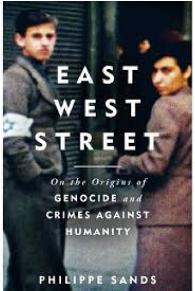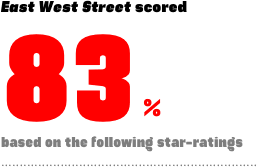 |
||||||||||||
 |
 |
|||||||||||
 |
 |
 |
 |
 |
 |
 |
||||||
 |
||||||||||||
 |
 |
 |
||||||||||
 |
||||||||||||





What was it about?
Beginning with a desire to understand more about his grandfather Leon's life story, barrister Philippe Sands gradually uncovers a network of connections that coalesce in the city of Lvov, in Ukraine. Sands weaves a compelling story uncovering the connections that led two very different lawyers, Hersch Lauterpacht and Rafael Lemkin, to play key roles in the Nuremberg trials that form the culmination of the book. Prior to 1945 the concepts of Crimes against Humanity and Genocide were not part of international law in a way that we now take for granted. Sands explains how these terms came into being and makes a powerful case for their importance and the need for us to be on guard against their erosion in the future.
What did we think of it?
Kate had sold this book to the group on the basis that Sands was so good he made even the debate over the positioning of a comma versus a semi-colon interesting, so naturally enough there was some discussion of this at the start. After some thorough analysis by the editors and lawyers among us, though, we were still slightly puzzled as to why the position of this punctuation made such a crucial difference to the interpretation. If this seems in any way interesting to you then read the book for more. A weakness of the book, it was felt, was that it's written for a general rather than a legal audience, and yet we thought he did a good job of explaining things without ever labouring his points. We liked the intermingling of past events with present day relationships (e.g., Sands and Nikolas Frank, the son of the Governor of Poland, Hans Frank) and the way the personal family histories interwove with the events leading up to the trial.
We also felt it was an important book to read at a time when the political ties that have bound Europe together since the Second World War are in danger of fragmenting. We were left with a new appreciation of humanitarian law, and the way individuals and groups are protected now in a way that at one time they were not.
We enjoyed the dispassionate touch Sands brought to the story, and were impressed at the volume and density of his research. Part of what propels this book is the detective story, following the clues from his grandfather's archive to uncover the mysteries of the past, and these individual stories are well told. For some there could have been more personal depth, and the detached quality put people off rather than drawing them in. For others that quality of distance enabled them to work through some quite distressing material that otherwise would have been difficult to read. We talked about an interesting FT article by Lucy Scholes about the rise of the 'bibliomemoir' – how increasingly memoirs and histories are becoming more personal, with examples like Helen MacDonald's H is for Hawk or Edmund de Waal's The Hare With Amber Eyes.
Would we recommend it?
For almost everyone in our group this was a captivating book that we thought was an important read as well as a fascinating one. If you like more lyricism in your memoirs, though, try The Hare With Amber Eyes by Edmund de Waal instead.
![]()
![]()
I found this very informative, moving and indeed upsetting in places, probably because I'm not very tough. But I did think there were gaps. Sands focused on the legal backgrounds of protagonists at the expense of the biographical details of their lives and I wanted to know more about their relationships. But a remarkable, powerfully written achievement all the same.
![]()
![]()
A masterpiece of research and scholarship. It deserves five stars for the work that went into it, but it's getting three and a half from me for the reading pleasure. This book reignited my belief in the law. But I couldn't help wondering if Sands was airing things that ought to be forgotten? Is it morally questionable for this?
![]()
![]()
A remarkable balance of historical narrative, family story and legal overview. Sands made it very accessible. I could have had more on the legal side, especially the genesis of international criminal law. At some points I did feel there was an overload of information (the detailed CVs of the professors of law, for example). But this didn't detract at all from my enjoyment, and all things considered this was a concise book given how much material Sands uncovered. I'm happy to have discovered it.
![]()
![]()
I found this surprising and compelling in equal measure, and I enjoyed the slow unfolding of the story, the layering of detail building up to a comprehensive picture at the end. I thought Sands wove together the different strands of his narrative brilliantly and I loved that he somehow managed to make me interested as to the specific use of a comma or a semicolon in a legal article. I thought the real hero of this story is the law and the framing of that law, and liked that it's a kind of rallying cry for how important it is that we recognise and protect the international criminal framework established after the war. An illuminating delight.
![]()
![]()
I thought this was three books, which it didn't need to be, and for me none of them delivered fully. I didn't really learn enough or feel enough for them to work for me. It was dry and overlong. I wanted to know more about the crimes and less about Sands' family – I think there are better family memoirs out there.
![]()
![]()
I can't quite give it five stars because I don't think he's a particularly brilliant writer, but I loved the research and the level of detail. I thought it an important book. To discover the origin of the terms crimes against humanity and genocide was fascinating and felt particularly relevant to me at a point in time when we're on the point of pulling out of the European Court of Human Rights combined with the rise of facism and the far Right in Eastern Europe. And I was struck by the silence of that past generation who endured but did not speak of their experiences. I loved the dispassionate quality Sands brought to his work. An amazing book.
![]()
![]()
I was gripped by this. An amazing weaving together of research and coincidence and scholarship and just enough law for my taste. Occasionally I thought it a bit under-edited: he sometimes repeats himself, he refers to photographs that don't then appear, and there's too much detail, particularly towards the end. But the central ideas about genocide and crimes against humanity I found fascinating. I enjoyed it enormously.

Our first book club of 2018 and we sat down at Sally's house for a sumptuous supper that happily did not include live lobsters or cold porridge. Kate contributed caviar crisps, which were generally thought to be disgusting.